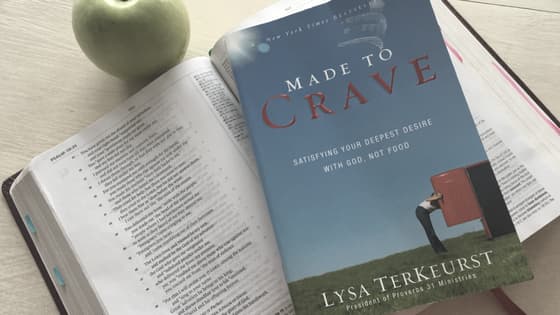
by Kelli Garms | Feb 19, 2019 | Spiritual Growth, Women's Ministry
August of 2017 was a hard month. That is when my dad passed away after battling Alzheimer’s. That disease tested our faith, tugged at our family bonds, and triggered hard questions.
In early September, we scheduled a cruise. I was looking forward to getting away from everything, relaxing, and returning refreshed. As soon as we stepped foot on that boat, we were notified of schedule changes due to a looming hurricane. Irma did impact our vacation by cutting our cruise short and stranding us for several extra days.
I tried very hard to stay positive and encourage my husband and kids, but I distinctly remember a moment when I looked up to the turbulent clouds, threw my hands up, and said, “Really, Lord?? You couldn’t give me this one little thing??”
You might be nodding right now, feeling my frustration, and agreeing with my outburst. But I can’t tell you how many times that memory has haunted me over the last couple of weeks as I studied Acts 16.
Paul and Silas were illegally seized, beaten, and thrown in prison. They were placed in the most secure part of the prison with their feet in stocks. They were sitting in a dirty room with open and bleeding wounds all over their backs, legs, and arms. I’m sure everything hurt.
They had been doing God’s work. They were imprisoned because Paul freed a slave girl from a demon. But when they were thrown in prison, they didn’t ask “Why, God?” Instead, they spent their time praying and singing praises to God for all the other prisoners to hear.
Acts shows us there was a purpose for their pain: the jailer and his whole family began their relationship with Christ that day.
I don’t know what you’re going through, and I don’t believe it is wrong to ask God why, but even if He doesn’t show you immediately, be encouraged by the fact that there is purpose for our pain.

by Kelli Garms | Feb 8, 2019 | Spiritual Growth, Women's Ministry
Michelle Myers spoke on this at the She Works His Way Narrow conference, and I’ve seen it “trending” on social media. I love Jesus, but I… I love Jesus, but I gossip. I love Jesus, but I tell white lies. I love Jesus, but I… (plug in your sinful activity here).
I think the idea behind this is authenticity. As sinful creatures, we will struggle our entire lives, and we want others to know they are not alone. But… that little conjunction “but” carries a different meaning. (Excuse me while I geek out a bit on grammar.)
That conjunction “but” does two things in this context:
First, it tells me that what is coming does not reflect what was just said. Think about that for a minute. “I love Jesus, but I gossip” tells the listener that the speaker acknowledges that gossiping is not a reflection of loving Jesus, but it is, in fact, the opposite.
Second, it tells me that what is coming is MORE IMPORTANT than what was just said. “I love Jesus, but I gossip” means that gossiping has a higher priority than my love for Jesus. Let that sink in. My love for Jesus does not trump my desire to sin. Ouch!
As believers, we must be careful with our words. Instead of “I love Jesus, but I gossip,” we should be saying “I love Jesus, so I strive to stop gossiping.” The end should reflect the beginning. Our lives should reflect our love for Jesus. We can do this and still be authentic in our struggles.
Replace your “I love Jesus, but I…” with “I love Jesus, so I…”

by kelligarms | Mar 17, 2017 | Spiritual Growth, Women's Ministry
I’ve been reluctant to post this blog for several reasons. First, it will not be complete. No matter how long it is or how much I say, it will not be the end of the journey where the proof is in the pudding. Second, there are so many opinions about weight loss and healthy living I’m afraid this will just get lost in the cacophony of ideas. I’m also reluctant because I have not arrived. I am in no way setting myself up as an example to follow because I am still learning to practice what I know is truth when it comes to health and diet.
In the previous blog post, we talked about our bodies being a gift from God, which He formed and knitted together while we were still in the womb. Our response to God’s gift should be one of gratitude and awe. Unfortunately, our response is usually one of criticism and disdain for our bodies. If I can learn to see my body in light of the gift and purpose God has given me, I can change my attitude toward the “imperfections” I see when I look in the mirror.
Although my body is a gift from God, once I become His child, my body no longer belongs to me. Romans 12:1 tells me that I am to present my body as a living sacrifice. First Corinthians 6:19-20 tells me that my body is not mine because it is the temple of the Holy Spirit, and, as a result, I am to glorify God with my body.
When I think about the sacrifices offered to God in the Old Testament, I am reminded that the Israelites were commanded to offer their best. They were to choose a lamb without spot or blemish. It couldn’t be lame. It had to be perfect. The final sacrifice was Jesus Christ. A perfect, spotless, sinless lamb Who took on the sin of the world so I might become a child of God. If these are my examples of sacrifices that are acceptable to God, then I must conclude that offering my body as a living sacrifice cannot be an afterthought. I can’t offer God the leftovers of my body. I must take care of my body in order to make it an acceptable sacrifice.
But if my body isn’t perfect, can I still offer it as a living sacrifice to God? The fact is that God is more concerned about the condition of my heart than the condition of my body. In 1 Samuel 16:7, God tells Samuel to not look on the outward appearance when choosing the next king of Israel because “the Lord sees not as man sees: man looks on the outward appearance, but the Lord looks on the heart.” When I read these words, a breathe a sigh of relief. My body doesn’t have to be perfect.
What I have come to understand is that taking care of my body is actually a heart issue. Food is an addiction like no other. We can be addicted to eating it, and we can be addicted to avoiding it. Either way, unlike an addiction to drugs, alcohol, caffeine, etc., we can’t live without it. We must eat. Food can become a stronghold in my life if I don’t surrender it to God. When Satan tempted Eve, he did it with food, and she gave in to the temptation. When Satan tempted Christ in the wilderness, he also used food as his first temptation and moved on to other things when Christ didn’t surrender to the food. I can’t begin to count the number of times I’ve been tempted with food and gave in so Satan didn’t have to move on to the next temptation. I have made it so easy for him!
Galatians 5:16 says, “But I say, walk by the Spirit, and you will not gratify the desires of the flesh.” Eating chocolate is definitely a desire of the flesh for me. The same book, same chapter, goes on to list the fruit of the Spirit in verses 22-23. One of those fruits is self-control. This fruit carries the idea of discipline and perseverance. We are disciplined about things we view as important, but being disciplined about something doesn’t mean it takes over your life or becomes an idol in your life. I am disciplined about brushing my teeth every morning and every night, but it doesn’t control my life. Although diet and exercise can easily become idols in my life, if I’m continually surrendering them to God and presenting my body as a living sacrifice, I believe my efforts will be rewarded with a closer walk with Him.
In Lysa TerKuerst’s book Made to Crave, she talks about tying your happy to Jesus. Your happy can’t be tied to the number on the scale or the size of your jeans. If your happy is tied to Jesus, then it won’t be moved by your circumstances because Jesus never changes.
For a more thorough discussion on this topic, I recommend you read Made to Crave.

by kelligarms | Jan 24, 2017 | Spiritual Growth, Women's Ministry
If your Facebook feed is anything like mine, it has been flooded with advertisements for Daily Burn and sunrise yoga. This time of year brings with it thoughts of resolutions and goals for the new year. This is the time of year when I decide it’s time to change my diet and my body, and I begin comparing my body to the bodies of others.
Of course, I know the bodies on television are not real. I remember when I was around 12 years old, I learned that Vivian Leigh, the actress who played Scarlett O’Hara on Gone with the Wind, had been duck taped to push her breasts together and give her cleavage. I also understand the still pictures in magazines are photoshoped sometimes to the point of disfigurement. But what about my friend whom I meet walking down the hallway at church? I sure wish I looked as good as she does! The truth is, for all I know, she is wearing three layers of Spanx under that pencil skirt. There is no such thing as a perfect body. Think of the person you know whom you would describe as perfect. Maybe she is tall and thin and has gorgeous skin and hair. I promise you she has body image issues just like the rest of us.
Maybe your issue is your body shape, and I don’t mean the extra weight you’re carrying around your middle. I mean the shape of your body. Maybe you are too pear shaped, or you’re too short, or your calves are too big, or your shoulders are too rounded. Maybe you struggle with adult acne. I firmly believe it should be against the laws of nature to have wrinkles and pimples at the same time! Can I get an “amen”? Maybe your teeth are too big or too crooked or too yellow. Maybe your hair is too curly or frizzy or too limp or too the-wrong-color. Maybe you’re more concerned with aging and everything it brings with it: poor eyesight, body aches, or the fact that every time you sneeze, you pee a little. No matter who you are, if you are female, you have struggled with your body.
But the fact is, your body is a gift. God made your body specifically for you. Psalm 139:13 says, “For you formed my inward parts; you knitted me together in my mother’s womb.” The Psalmist acknowledges that God intentionally put his body together. God formed you and knitted you together while you were still in the womb. This description conjures up painstaking, detailed work. I picture God with head-mounted magnifying glasses working tirelessly on the tedious details of sewing very small parts together.
Have you ever made a gift for someone? Maybe you hand made a card for a family member, or you crocheted a scarf for a friend. Maybe you made an elaborate and time-consuming quilt as a gift for someone. What reaction did you want the recipient to have when he or she saw the gift? What reaction do you have when your child brings you something he made for you? Do you say “you used red, but I wish you had used purple”? Or do you ask, “can I have the one you made for daddy instead?” Just picturing the expression on my daughter’s face if I responded to her gift in that way makes me cringe. And yet, I do it to God everyday. Every time I complain about my curly, frizzy hair, I’m telling God that He made a mistake. When I compare my body to my friend’s body, I’m telling God that He got it wrong. Those times I criticize my nose or my eyes or my thighs, I am expressing ingratitude for the gift God has given me.
The Psalmist had the right idea when he continued in verse 14, “I praise you, for I am fearfully and wonderfully made. Wonderful are your works; my soul knows it very well.” I must praise God for the gifts He gives me, including my body. I need to acknowledge that He knows what He’s doing, and He knows what’s best for me.
Not only did God form you the way you are intentionally, but He did it with a purpose and for a purpose. In Jeremiah 1:5-6 God tells Jeremiah, “Before I formed you in the womb I knew you, and before you were born I consecrated you; I appointed you a prophet to the nations.” God knew what Jeremiah was going to do before Jeremiah was born; therefore, God created Jeremiah with that purpose in mind and gave Jeremiah the tools he would need to accomplish the task. It is the same for me. God knows what purpose my life will serve, and He created me with the right tools for the job. When God asks me to do something, I know that He has already equipped me for that purpose. This knowledge gives me the confidence to take the step of faith required to accomplish His will.
My challenge is the next time I am tempted to criticize my body, I will remember that God intentionally formed me and knit me together. I will take the time to praise Him for my body and my abilities rather than be ungrateful for the gifts He has given me. Will you join me?
(Because this post is not to be used as an excuse for being overweight, in the next blog post we will look at the connection between pursuing weight loss and pursuing godliness.)

by kelligarms | Jun 29, 2016 | Spiritual Growth, Women's Ministry
“Your job is simply to be obedient to God. He will handle everything else.” –Lysa Terkuerst
There are so many examples given to us in Scripture that support this statement:
Abraham was told to leave his people, but he was not given a destination.
Moses was instructed to go to Pharoah and tell him to let the Israelites go, but it was not to be done in his own power or ability.
Joshua was told to march around a fortified city for seven days and trust that God would give him the victory.
Even Mary, the mother of Jesus, was given the task of birthing and raising Jesus without knowing what her society in that culture would do to her.
Even with so many examples, we find it so hard not to plan out how everything in our lives is supposed to go. Sometimes, our job is simply to show up. God will do the work. Do you trust Him enough to let go?
(Originally posted in the Women of Crossway newsletter Exchange.)

by kelligarms | Jun 15, 2016 | Spiritual Growth, Women's Ministry
When You don’t move the mountains I’m needing You to move; when You don’t part the waters I wish I could walk through; when You don’t give the answers as I cry out to You; I will trust, I will trust, I will trust in You — Lauren Daigle
When you beg God for healing, for financial relief, for a spouse, for children, for direction in your life, and He doesn’t answer by giving you what you desire, do you turn away from Him or do you trust in Him? What if your desires pale in comparison to His plans for you?
I challenge you to patiently wait on Him, trusting that His plans are far superior to anything you could ever imagine!
Jeremiah 29:11 (NIV) For I know the plans I have for you,” declares the Lord, “plans to prosper you and not to harm you, plans to give you hope and a future.
Ephesians 3:20-21 (NKJV) Now to Him who is able to do exceedingly abundantly above all that we ask or think, according to the power that works in us, to Him be glory in the church by Christ Jesus to all generations, forever and ever. Amen.






